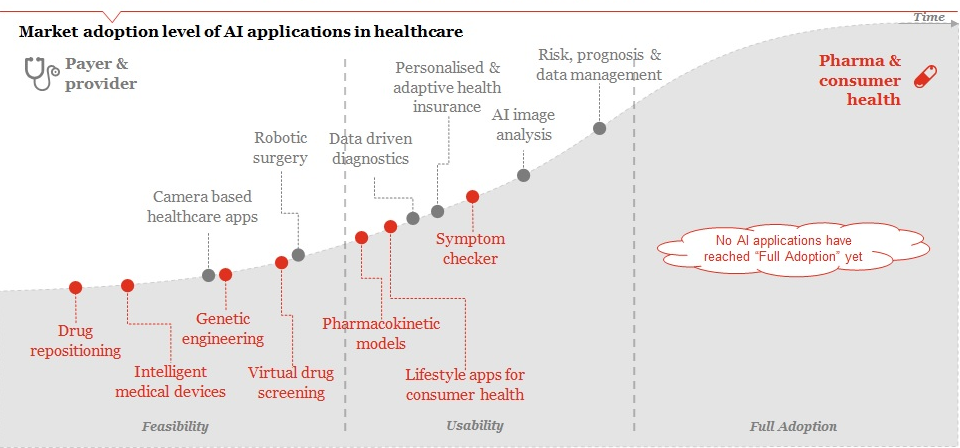'Unlocking Innovation: Cognitive and Digital Tech Developments for Improved Drug Development' - By Jo Pisani, PwC
By Jo Pisani, UK Life Sciences Consulting Leader PwC Strategy& and Rob McCargow, AI Programme Leader, PwC

Artificial Intelligence (AI) has been heralded for several years now as the key to unlocking innovation and efficiencies in the life sciences industry. There are now many real life examples of AI delivering value and stimulating the growth of UK based companies. But what are the further opportunities from AI? What types of companies and partnerships will it stimulate? And what needs to happen before it is a success in the UK? This blog will explore some of these topics, many of which will be developed further during the upcoming BIA CEO and Investor Forum on 23-24 May.
AI is largely being applied in three healthcare settings today (by payers, providers and in life sciences), and are capturing billions of dollars in value. Healthcare players are more mature than life sciences players in putting AI into real life use, where efficiency problems are potentially easier to address. For example, payers (US healthcare insurers) are using AI to eliminate waste and fraudulent claims with a potential benefit of $77bn in the US alone based on improper payments of Medicare/Medicaid; and providers can improve clinical decision support (a benefit of $17-29bn in the US based on the cost of medical errors). Companies such as Avicenna (image interpretation) and Kaiser Permanente (predictive models for diabetes) have also been using machine learning effectively in these two areas.

However, there are still substantial opportunities for life sciences companies to exploit AI through automating processes, augmenting decision making, innovating with new services and reducing cost:
- Using current AI machine learning technologies to improve the efficiency and accuracy of development and regulatory processes. For example, using machine learning to identify new drug targets and to repurpose existing molecules for new disease areas; and the use of AI for managing pharmacovigilence through improved safety signal detection
- Using advanced AI techniques such as deep learning and cognitive computing that can potentially mimic the thinking of the human brain to solve complex tasks and offer the promise of continually learning predictive models for disease progression and determining patient base solutions
AI’s impact on health has not yet reached its full potential. Health analytics and cognitive computing solutions are among the fastest growing segments within health IT with consolidations and continued adoption expected over the next few years. Consequently, investors are betting on AI, and startups are constantly emerging and attracting funding. For example, Brainomix recently received £7m of venture capital funding for its AI powered assessment of stroke patients' CT scans.
However, according our research adopting AI as a technology does bring with it some inherent risks and trust issues. These will need to be overcome through adopting an approach to overcome potential barriers (such as data bias or regulatory concerns over governance and ethics, as discussed in a recent report by Future Advocacy). Initiatives such as the Ada Lovelace Institute and the Centre of Data Ethics and Innovation will also help address these issues. Medical staff may find it hard to trust systems when they don't understand/can't see how an outcome has been determined so transparency is critical.
We simply don't have an equivalent level of oversight and regulatory processes yet in Life Sciences as we do for technology companies. Therefore, within PwC we have been advising our clients to consider our responsible AI approach.
AI offers the opportunity for UK Life Sciences to maintain its global leadership position, emulating the success of companies such as DeepMind Health, BenevolentAI and the companies represented on our panels at the BIA CEO and Investor Forum in two weeks (including Exscientia, GTN and Desktop Genetics). The focus on AI as a core part of the UK Industrial Strategy and the launch of the AI Sector Deal in the last few weeks demonstrate government recognition of the strategic importance of this new tech to the UK. Coupled with the increasing availability of clinical data from the NHS and genomic data from Genomics England and UK Biobank, the UK has already been provided with the building blocks for success.
.png)
.png)